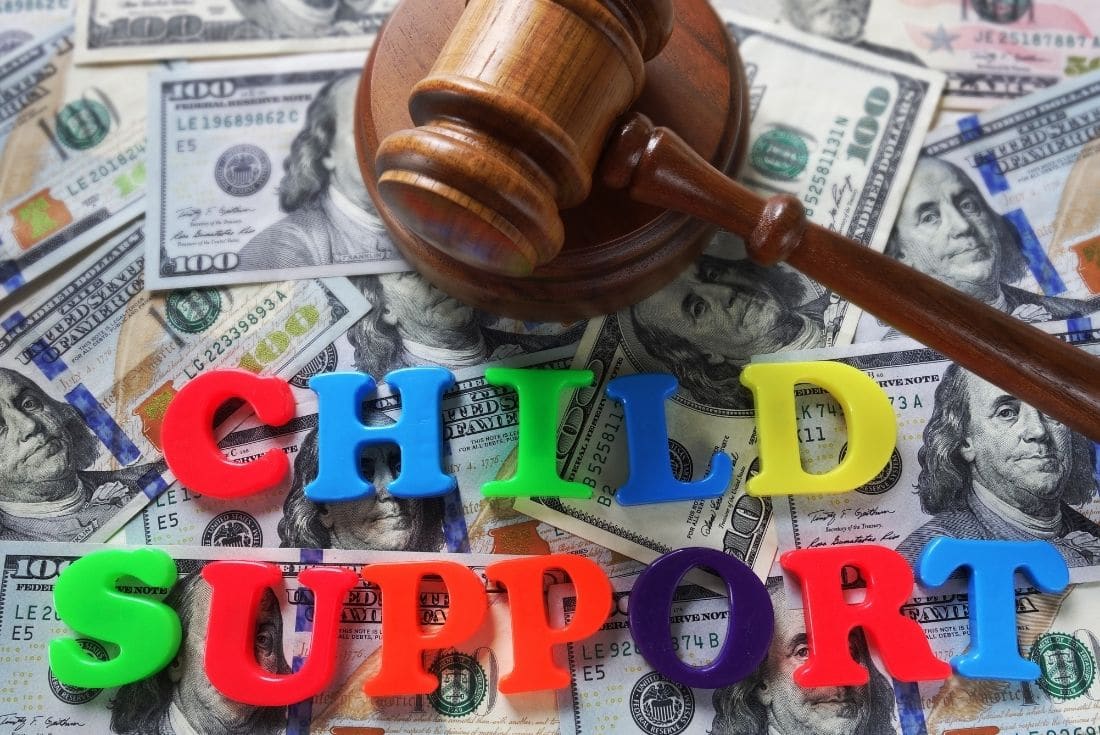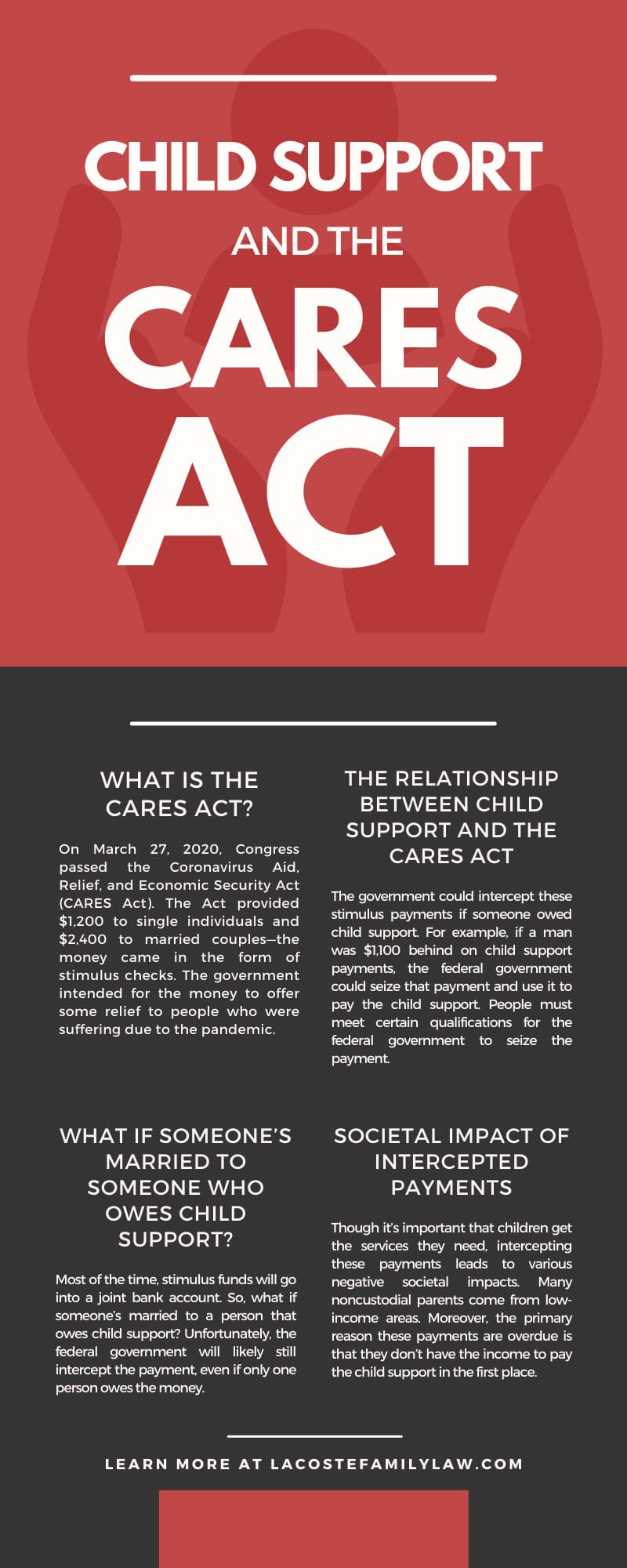
09 Aug Child Support and the CARES Act
The COVID-19 pandemic has transformed life as we know it. One group of people especially affected by the crisis are divorced parents. People had to figure out custody matters with children learning from home and transfer them from one home to another while social distancing. Another point of contention during this time was child support. Millions of people lost their jobs and have struggled to find work. This begs the question: do child support laws remain the same?
This article will explain the relationship between child support and the CARES Act. Learn about the intended uses for child support and how to make the right decisions by reading ahead.
What Is the CARES Act?
On March 27, 2020, Congress passed the Coronavirus Aid, Relief, and Economic Security Act (CARES Act). The Act provided $1,200 to single individuals and $2,400 to married couples—the money came in the form of stimulus checks. The government intended for the money to offer some relief to people who were suffering due to the pandemic.
The Relationship Between Child Support and the CARES Act
The government could intercept these stimulus payments if someone owed child support. For example, if a man was $1,100 behind on child support payments, the federal government could seize that payment and use it to pay the child support. In this scenario, that man would only receive $100 of the $1,200 expected, assuming he was single.
People must meet certain qualifications for the federal government to seize the payment. Under TANF Title IV-E foster care cases, people had to be $150 past due for the government to seize their stimulus check. Non-TANF IV-E Medicaid cases need to be at least $500 behind in payments. However, if payments exceed either of these numbers, the government will take the back pay out of the stimulus check.
What if Someone’s Married to Someone Who Owes Child Support?
Most of the time, stimulus funds will go into a joint bank account. So, what if someone’s married to a person that owes child support? Unfortunately, the federal government will likely still intercept the payment, even if only one person owes the money. The other person can file an appeal to try and get their half of the money under a different legal act. However, this will take a considerably long time, and the outcome may be less than favorable.
Societal Impact of Intercepted Payments
As previously stated, the COVID-19 pandemic turned life upside down. The CARES Act was supposed to provide economic relief to those who are struggling. Though it’s important that children get the services they need, intercepting these payments leads to various negative societal impacts. Many noncustodial parents come from low-income areas. Moreover, the primary reason these payments are overdue is that they don’t have the income to pay the child support in the first place. This has adversely affected fathers more than mothers.
Unfortunately, people can’t stop the government from seizing stimulus checks to pay overdue child support payments. But the societal impacts force us to look at the child support system as a whole. The remainder of this piece will discuss what child support payments are supposed to cover and how judges make these decisions.
What Does Child Support Cover?
Child support exists to limit the amount of change a child undergoes. Judges want children’s lives to change as little as possible as a result of their parents’ divorce. Child support should cover the things the child had when their parents were married. Here are a few examples of what child support should cover:
- Educational needs. The child should have everything they need to be successful in school, including school supplies and electronic devices.
- Extracurricular activities. Children should be able to participate in the same activities they did when their parents were married, such as sports or school clubs.
- Basic necessities. The child shouldn’t lack any basic necessities, like clothing, food, and shelter.
How Do Judges Make Their Decisions?
Many factors contribute to a judge’s decision regarding child support. For the most part, the noncustodial parent will give the custodial parent a certain amount of money every month. The judge will also look into how much money each parent makes. The point of child support is not to inconvenience one parent while the other spends as much money as they want. Instead, child supports works to ensure that children have everything they need, even if their parents are separated.
No one could have ever imagined the impact the COVID-19 pandemic would have on our daily lives. Businesses were forced to shut their doors and children had to start taking classes from home. Divorced parents had to begin navigating an unprecedented situation. Who would get the children while they were schooling from home? How could you pick up the children while maintaining social distancing? These circumstances required divorced parents to work together and get their children through the pandemic.
Another thing affected by the pandemic was child support. For starters, some parents became unable to make payments due to unemployment or other circumstances. The CARES Act was meant to alleviate these burdens, but people who owed child support were in for a surprise. The federal government could intercept these payments if someone owed child support payments. The point of this was not to burden parents even further, but ensure that the children have everything they need despite what’s going on in the world.
This has been one of the most stressful times in global history. The COVID-19 Delta variant is on the rise, and there’s no telling what school will look like next year. This time is especially challenging for parents who owe overdue child support payments. LaCoste Family Law has knowledgeable child support lawyers in Washington State for those who are concerned with the current state of things. We’ll work with you to determine a plan that is beneficial for everyone and eases the burden on the noncustodial parent. If you have any questions or want more information, don’t hesitate to contact us.


